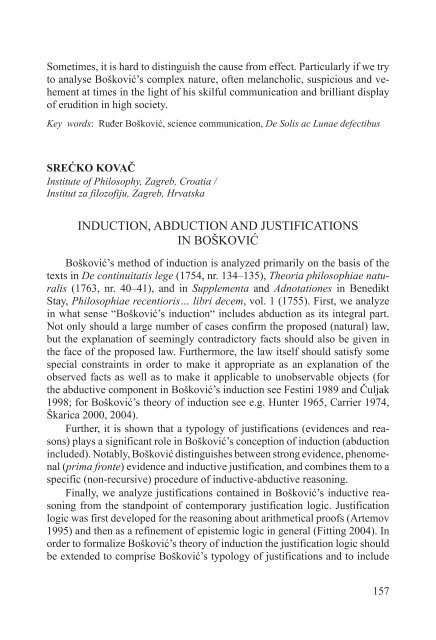Programska knjižica - Hrvatsko filozofsko društvo
Programska knjižica - Hrvatsko filozofsko društvo
Programska knjižica - Hrvatsko filozofsko društvo
Create successful ePaper yourself
Turn your PDF publications into a flip-book with our unique Google optimized e-Paper software.
Sometimes, it is hard to distinguish the cause from effect. Particularly if we try<br />
to analyse Bošković’s complex nature, often melancholic, suspicious and vehement<br />
at times in the light of his skilful communication and brilliant display<br />
of erudition in high society.<br />
Key words: Ruđer Bošković, science communication, De Solis ac Lunae defectibus<br />
SREĆKO KOVAČ<br />
Institute of Philosophy, Zagreb, Croatia /<br />
Institut za filozofiju, Zagreb, Hrvatska<br />
INDUCTION, ABDUCTION AND JUSTIFICATIONS<br />
IN BOŠKOVIĆ<br />
Bošković’s method of induction is analyzed primarily on the basis of the<br />
texts in De continuitatis lege (1754, nr. 134–135), Theoria philosophiae naturalis<br />
(1763, nr. 40–41), and in Supplementa and Adnotationes in Benedikt<br />
Stay, Philosophiae recentioris… libri decem, vol. 1 (1755). First, we analyze<br />
in what sense “Bošković’s induction“ includes abduction as its integral part.<br />
Not only should a large number of cases confirm the proposed (natural) law,<br />
but the explanation of seemingly contradictory facts should also be given in<br />
the face of the proposed law. Furthermore, the law itself should satisfy some<br />
special constraints in order to make it appropriate as an explanation of the<br />
observed facts as well as to make it applicable to unobservable objects (for<br />
the abductive component in Bošković’s induction see Festini 1989 and Čuljak<br />
1998; for Bošković’s theory of induction see e.g. Hunter 1965, Carrier 1974,<br />
Škarica 2000, 2004).<br />
Further, it is shown that a typology of justifications (evidences and reasons)<br />
plays a significant role in Bošković’s conception of induction (abduction<br />
included). Notably, Bošković distinguishes between strong evidence, phenomenal<br />
(prima fronte) evidence and inductive justification, and combines them to a<br />
specific (non-recursive) procedure of inductive-abductive reasoning.<br />
Finally, we analyze justifications contained in Bošković’s inductive reasoning<br />
from the standpoint of contemporary justification logic. Justification<br />
logic was first developed for the reasoning about arithmetical proofs (Artemov<br />
1995) and then as a refinement of epistemic logic in general (Fitting 2004). In<br />
order to formalize Bošković’s theory of induction the justification logic should<br />
be extended to comprise Bošković’s typology of justifications and to include<br />
157

















